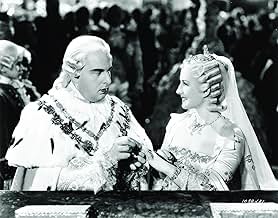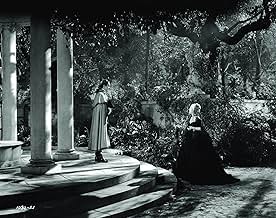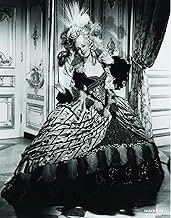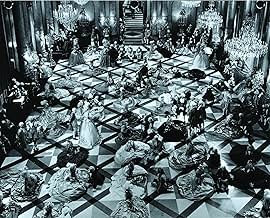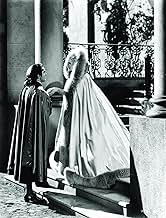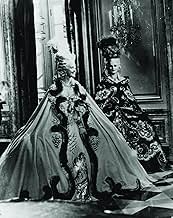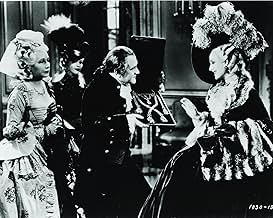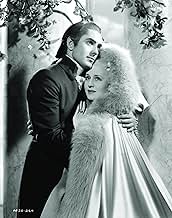VALUTAZIONE IMDb
7,3/10
3462
LA TUA VALUTAZIONE
Aggiungi una trama nella tua linguaThe tragic life of Marie Antoinette, who became queen of France in her late teens.The tragic life of Marie Antoinette, who became queen of France in her late teens.The tragic life of Marie Antoinette, who became queen of France in her late teens.
- Regia
- Sceneggiatura
- Star
- Candidato a 4 Oscar
- 5 vittorie e 5 candidature totali
Albert Dekker
- Comte de Provence
- (as Albert Van Dekker)
Recensioni in evidenza
This movie will probably never be excelled largely because of the casting. I don't believe that anyone will ever find better actors or actresses to portray King Louis XVI and Queen Marie Antoinette than Robert Morley and Norma Shearer. The black and white aspect of this great classic film is simply spell binding in its interpretation of the life of the Royal Family. Color will give it a different dimension. The manner in which the conflict of the ensuing mob marching upon the Versailles is well portrayed. I especially like the sense of paranoia and fear that grip the Queen and her entourage. The use of the outside gate is especially endearing to me, reminding me why it is that King Louis XIV created the Château d' Versailles in such a distance from Paris. Unless one knows the history of the Château, nobody can truly appreciate the march of the Faubourgs. Excellent film, and I recommend seeing it before any other on the same subject!
It never ceases to amaze me at how completely I might be suddenly drawn into the emotional moment of a film by the power of the actor. Usually the strongest ones come suddenly, and without warning, giving you no time to put up defenses. Brando's eruptions of moods when talking to his dead wife in Last Tango in Paris is probably the most dramatic example of this. (His greatest scene ever, that I have witnessed) But before that, Norma Shearer's panic and utter emotional breakdown when the guards come to take her son from her in the prison, is overwhelming and complete. Anyone who is not genuinely moved to the core by this incredible performance, either sleeps or does not possess those human sensitivities that are torn by the loss of a child. For it is not sympathy that is evoked, but an empathy called forth by the raw, human agony of the suffering before you. Years later when I visited the actual site in Paris where that tragedy would have taken place, I experienced a time of respect and reflection such as I have never had in any other place in the world that I have visited.
This is one of the truly great films. If you want to find out how deeply someone can feel, show it to them and observe. Norma Shearer set a standard I fear has been forgotten, as evidenced by the way tinsel town hands out awards today for mediocre work pushed onto the modern consciousness by glitzy ad campaigns and self-serving accolades.
This is one of the truly great films. If you want to find out how deeply someone can feel, show it to them and observe. Norma Shearer set a standard I fear has been forgotten, as evidenced by the way tinsel town hands out awards today for mediocre work pushed onto the modern consciousness by glitzy ad campaigns and self-serving accolades.
MGM's lavishly budgeted look at the French Revolution during the reign of King Louis and his famously selfish MARIE ANTOINETTE spares no expense in detailing the grim background of court conspiracies and the people's unrest that led to their downfall.
Too bad none of this eye-popping splendor wasn't captured in Technicolor, as originally planned--but with a budget well over 1.5 million it was decided to film it in glorious B&W. No matter, it's still a spectacle for sore eyes.
There can be no doubt about NORMA SHEARER's triumph in the title role nor is any of the acting in the large cast below standard. ROBERT MORLEY as the weak and indecisive Louis is immensely touching and effective as he realizes the gravity of their predicament. JOHN BARRYMORE is fine and Joseph SCHILDKRAUT is wonderful as an aristocratic fop. TYRONE POWER lends his romantic presence to a role that requires little more than his good looks. He and Shearer make a physically appealing romantic team.
It's interesting that Irving Thalberg died before production began on the film. One wonders whether his influence on it might have made it an even stronger production. There are definite lulls in the telling but it builds dramatically to all of the final scenes. It's the kind of film that leads one to read more about the actual events and that's always a good thing.
Summing up: Sumptuously produced, well acted and well directed--what more could you want for an interesting glimpse of a life of royalty among a time of social upheaval? Shearer's triumphant return to the screen after a two-year absence.
Too bad none of this eye-popping splendor wasn't captured in Technicolor, as originally planned--but with a budget well over 1.5 million it was decided to film it in glorious B&W. No matter, it's still a spectacle for sore eyes.
There can be no doubt about NORMA SHEARER's triumph in the title role nor is any of the acting in the large cast below standard. ROBERT MORLEY as the weak and indecisive Louis is immensely touching and effective as he realizes the gravity of their predicament. JOHN BARRYMORE is fine and Joseph SCHILDKRAUT is wonderful as an aristocratic fop. TYRONE POWER lends his romantic presence to a role that requires little more than his good looks. He and Shearer make a physically appealing romantic team.
It's interesting that Irving Thalberg died before production began on the film. One wonders whether his influence on it might have made it an even stronger production. There are definite lulls in the telling but it builds dramatically to all of the final scenes. It's the kind of film that leads one to read more about the actual events and that's always a good thing.
Summing up: Sumptuously produced, well acted and well directed--what more could you want for an interesting glimpse of a life of royalty among a time of social upheaval? Shearer's triumphant return to the screen after a two-year absence.
Here at The Rag, we've learned our lesson: No matter what, give a movie a chance. Just give a movie ten minutes, and if you still hate it as much as you thought you would, feel free to turn it off. If the movie stars an actress you despise, contains a supporting cast you don't normally like, and centers on a subject of which you have no interest, you just might find yourself riveted and impressed. What movie made us learn our lesson? Marie Antoinette, starring Norma Shearer, someone whose movies we'd previously avoided.
The first fifteen minutes of this movie are incredible. Adrian's costumes belong in a museum, as gown after gown after gown are breathtaking, and surprisingly did not bring home an Oscar for the remarkable designer. The Academy Awards didn't have an Oscar for costume design until 1948, which, when you think of all the incredible costumes present in the 1930s and 1940s, is shocking. The art direction, while awarded with a nomination, was passed over in favor of The Adventures of Robin Hood. The incredible sets laden with paintings, chandeliers, rugs, beautiful dishes, jewels, ballroom decorations, draperies, bedroom pieces, and other furniture, was passed over for a forest. When you watch this movie, you'll realize how silly that is. Another silliness is the lack of nominations for Best Picture and Best Director for W.S. Van Dyke. This is a large-scale, expensive, lush epic, and it's ridiculous to look back at Frank Capra's wins for You Can't Take It With You when Marie Antoinette wasn't even nominated.
This heavy epic chronicles Marie's time from age fourteen until her death. Norma Shearer is given an enormous amount to do, and she does it very well. She has to be giddy and young, excited for her marriage, disappointed, afraid, frivolous, betrayed, in love, a mother, and finally, destroyed. As a young girl, she gets betrothed to the soon-to-be King of France, and her wedding night with Robert Morley is an especially emotional scene. They both give excellent performances, and since I normally can't stand either, it's quite a compliment from me. Robert is simple and an introvert who doesn't want to expose himself to potential ridicule, and Norma just wants to be a good wife. When she realizes her marriage will be different than promised, she turns to material pleasures and surface relationships to make her happy.
With a supporting cast of Joseph Schildkraut as an enormously slimy villain, Gladys George as the famous du Barry, John Barrymore as an ailing king, Tyrone Power as the pretty but poorly acted love interest, and Henry Stephenson as a sympathetic ear, there are plenty of varied scenes in this long movie to keep you interested. As one of the earliest films to have an intermission, overture, and entr'acte, this takes a bit of the epic factor out of the following year's Gone With the Wind, which boasted of being the grandest epic of all time. Marie Antoinette is one of the great classics that is dramatic without being grotesque and manages to win you over even if you don't expect to be. Well done, Norma.
The first fifteen minutes of this movie are incredible. Adrian's costumes belong in a museum, as gown after gown after gown are breathtaking, and surprisingly did not bring home an Oscar for the remarkable designer. The Academy Awards didn't have an Oscar for costume design until 1948, which, when you think of all the incredible costumes present in the 1930s and 1940s, is shocking. The art direction, while awarded with a nomination, was passed over in favor of The Adventures of Robin Hood. The incredible sets laden with paintings, chandeliers, rugs, beautiful dishes, jewels, ballroom decorations, draperies, bedroom pieces, and other furniture, was passed over for a forest. When you watch this movie, you'll realize how silly that is. Another silliness is the lack of nominations for Best Picture and Best Director for W.S. Van Dyke. This is a large-scale, expensive, lush epic, and it's ridiculous to look back at Frank Capra's wins for You Can't Take It With You when Marie Antoinette wasn't even nominated.
This heavy epic chronicles Marie's time from age fourteen until her death. Norma Shearer is given an enormous amount to do, and she does it very well. She has to be giddy and young, excited for her marriage, disappointed, afraid, frivolous, betrayed, in love, a mother, and finally, destroyed. As a young girl, she gets betrothed to the soon-to-be King of France, and her wedding night with Robert Morley is an especially emotional scene. They both give excellent performances, and since I normally can't stand either, it's quite a compliment from me. Robert is simple and an introvert who doesn't want to expose himself to potential ridicule, and Norma just wants to be a good wife. When she realizes her marriage will be different than promised, she turns to material pleasures and surface relationships to make her happy.
With a supporting cast of Joseph Schildkraut as an enormously slimy villain, Gladys George as the famous du Barry, John Barrymore as an ailing king, Tyrone Power as the pretty but poorly acted love interest, and Henry Stephenson as a sympathetic ear, there are plenty of varied scenes in this long movie to keep you interested. As one of the earliest films to have an intermission, overture, and entr'acte, this takes a bit of the epic factor out of the following year's Gone With the Wind, which boasted of being the grandest epic of all time. Marie Antoinette is one of the great classics that is dramatic without being grotesque and manages to win you over even if you don't expect to be. Well done, Norma.
As a young actress still in her 20s, Norma Shearer was hailed as the First Lady of MGM, and she reigned as queen of the studio throughout the 1930s. For about two decades after early retiring in 1942, she was fondly remembered by fans and critics, but slowly she was mostly forgotten. Then in the early 70s, antagonistic film critic Pauline Kael, grudge-holding MGM rival Joan Crawford and others took delight in trashing her, usually with the implication that Norma's greatest talent was finding a powerful husband (Irving Thalberg). Unfortunately, those unfair remarks carried great weight since Shearer's movies were unavailable on video and rarely shown on TV.
We're now able to see her talent for ourselves, thanks largely to Turner Classic Movies, and Norma Shearer's star is rising again.
If you've never seen a Shearer movie, Marie Antoinette is a good beginning. It is one of Hollywood's great epics of the 1930s, with lavish costumes and scenery, and its historic setting holds up well. Shearer plays the doomed French queen from teenager to the Guillotine, and the final scenes as she awaits death in prison are among the finest of her career.
In recent years, Shearer has gained new respect for her silent and pre-code films, in which she was one of the most accomplished young actresses of the era. She often played sexually sophisticated women with a sly wit. She was not a typical ingénue, and you can see why audiences of the time were enchanted by her.
We're now able to see her talent for ourselves, thanks largely to Turner Classic Movies, and Norma Shearer's star is rising again.
If you've never seen a Shearer movie, Marie Antoinette is a good beginning. It is one of Hollywood's great epics of the 1930s, with lavish costumes and scenery, and its historic setting holds up well. Shearer plays the doomed French queen from teenager to the Guillotine, and the final scenes as she awaits death in prison are among the finest of her career.
In recent years, Shearer has gained new respect for her silent and pre-code films, in which she was one of the most accomplished young actresses of the era. She often played sexually sophisticated women with a sly wit. She was not a typical ingénue, and you can see why audiences of the time were enchanted by her.
Lo sapevi?
- QuizAccording to Wikipedia, the movie had thousands of costumes and lavish set designs. Adrian visited France and Austria in 1937 researching the period. He studied the paintings of Marie Antoinette, even using a microscope on them so that the embroidery and fabric could be identical. Fabrics were specially woven and embroidered with stitches sometimes too fine to be seen with the naked eye. The attention to detail was extreme, from the framework to hair. Some gowns became extremely heavy due to the embroidery, flounces and precious stones used. Norma Shearer's gowns alone had a combined weight of over 1,768 lb., the heaviest being the wedding dress.
- BlooperAt the time of their wedding, the Dauphin, Louis, was 15 and Marie Antoinette was 14. Norma Shearer could (barely) get away with portraying a 14-year-old (as she portrayed a 13-year-old Juliet in ROMEO AND JULIET (1936) because many noble/royal females were more mature and had regal bearing), but Robert Morley looked 35, not 15.
- Citazioni
Marie Antoinette: I once thought if I were queen, I'd be so happy. To be applauded and adored and obeyed. I don't want it now. I just want to be free. To be with you. To love you. I cannot wear a crown upon my heart.
- Versioni alternative"Unrestored" film has now been restored and is available on DVD. When the film played the Carthay Circle in Los Angeles and the Astor Theatre in New York as a reserved seat "road show" attraction, the print ran eleven minutes longer than the generally available 149 minute Turner Library print. These eleven minutes contained an overture, entr'acte, and exit music, with an intermission immediately following Antoinette's emotional farewell to Fersen on the steps of Versailles. These remnants of the "road show" presentation have now been restored to the new Warner Bros. Home Video DVD, which runs a little over 157 minutes.
- ConnessioniEdited into Hollywood: The Dream Factory (1972)
I più visti
Accedi per valutare e creare un elenco di titoli salvati per ottenere consigli personalizzati
- How long is Marie Antoinette?Powered by Alexa
Dettagli
Botteghino
- Budget
- 2.926.000 USD (previsto)
- Tempo di esecuzione2 ore 29 minuti
- Proporzioni
- 1.37 : 1
Contribuisci a questa pagina
Suggerisci una modifica o aggiungi i contenuti mancanti



